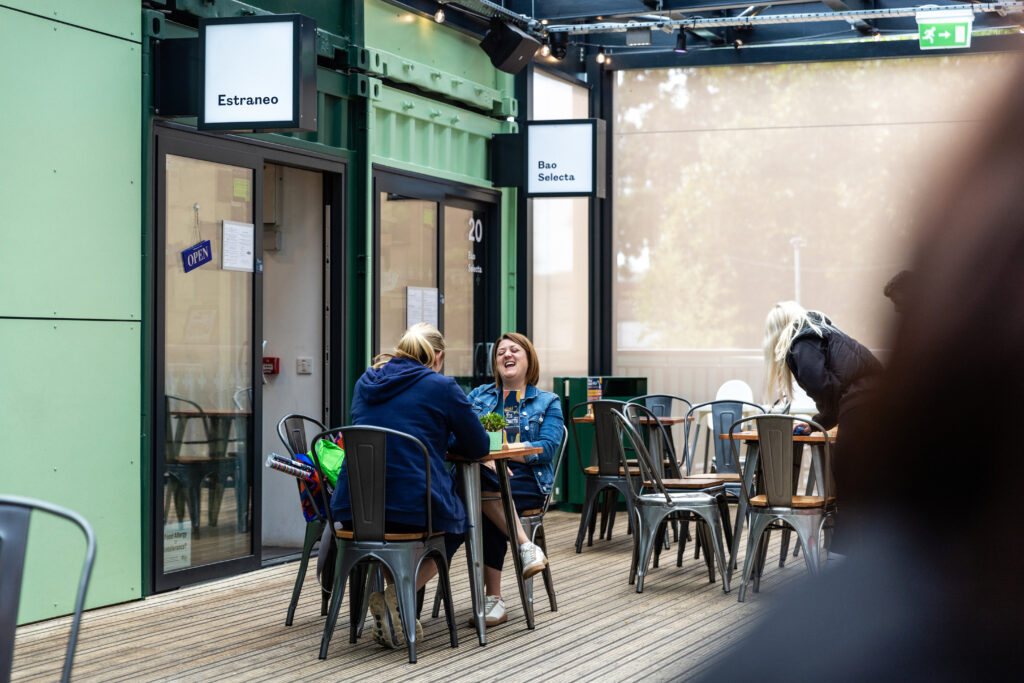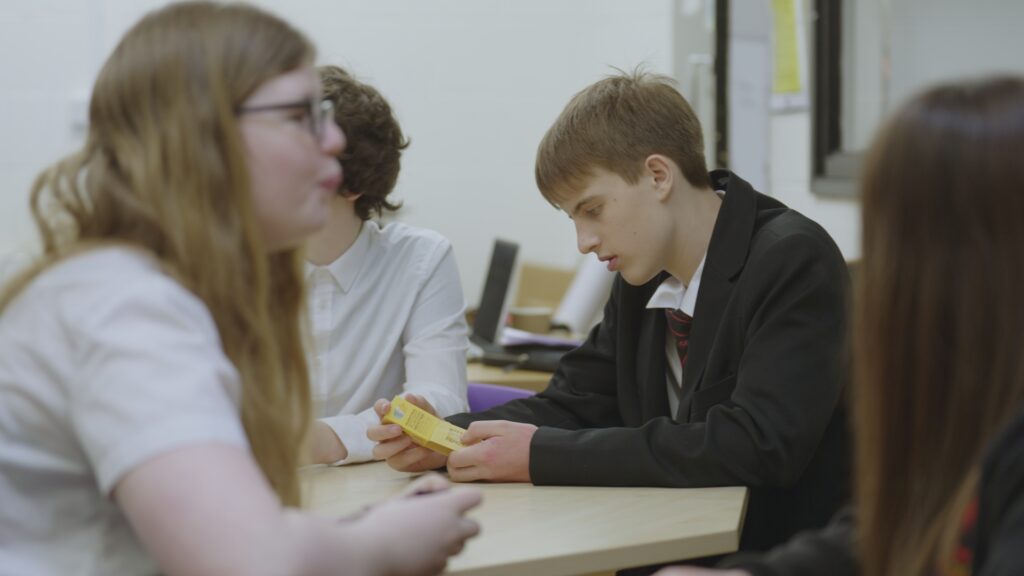How does learning Welsh help with other languages?

Aran Jones Author, SaySomethingIn
One of the silliest comments I’ve ever heard about learning Welsh is that people in Wales ‘should learn a useful language instead’. It’s silly on so many different levels, that’s what I love about it. It’s like watching a panda falling off a swing, or a dog trying to run on ice.
A more useful language – in Wales! – than Welsh?
You’d be amazed how rarely I’ve needed to use my Spanish or French in Caernarfon. Or in Cardiff, for that matter. Meanwhile, I have conversations in Welsh literally every day, wherever I am in Wales. I sympathise with people who aren’t very fond of maths, but this isn’t the most complicated equation you could imagine – there are more Welsh speakers in Wales than Spanish or French speakers.
Admittedly, I did meet an Italian speaker at our favourite restaurant a couple of weeks ago. I tried to use some of my rusty old bits of Italian. And then it turned out he was learning Welsh.
All of that is only the first level of silly, though.
“Waiter…”
The next step is usually the claim that even though there are, admittedly, Welsh speakers in Wales, literally any other language would be more useful if you were travelling.
Let’s skip over the obvious question about who exactly gets to spend all their time travelling, shall we? Let’s go straight to imagining that you’re one of those lucky people who can travel overseas for a week or two every year.
I’ve got a surprisingly useful top tip for you.
Don’t expect to find your French very helpful when you’re in Spain. Oh, and really don’t count on getting any use out of your Spanish when you’re in China.
So learning another language would be more useful than Welsh if you go on holiday to a country where they speak that language. Always the same country, every year. And that’s ‘more useful’ as in ‘asking for the bill in Spanish for two weeks in Malaga is more valuable than spending the other fifty weeks talking to people in Welsh’.
Yes, that’s our second layer of silly.
Hwyl a sbri…
But now we get to the fun part.
Ruffled by this point, your ‘other languages are more valuable than Welsh’ specialist will go in one of three directions. It will either be ‘more people speak French so if you learn French you can use it with more people’, or ‘there are more books in Spanish than in Welsh so if you learn Spanish you can read more books’, or ‘you can get more jobs by being a German speaker than a Welsh speaker’.
In real life, by this stage I’m usually struggling to keep a straight face, so I’ll often opt for ‘you might be right’ (which also means ‘you might be wrong’ but people don’t usually notice that).
What I really want to point out, though, is fairly straightforward.

Yes, there are more French speakers than Welsh speakers. But no, you don’t have enough time left in your life to meet all the Welsh speakers, so either way you’re not going to run out of new people.
Yes, there are more books in Spanish than in Welsh. You know where I’m going with this by now, don’t you? Again, no, you don’t have enough time left to read all the books in Welsh, so again you’re not going to run out.
And yes, there are more jobs that require German speakers than Welsh speakers (although curiously, not many of them are in Wales).
So if you’re planning on leaving Wales to work overseas, then yes, finally we can agree that there are languages that will help you more with that.
Twist
But hold on a second, we’ve got a twist in the tale.
Who’s more likely to learn German to the levels of fluency that will help you get a job? A monolingual person or a bilingual person?
If you guessed bilingual, well done! Your chocolate egg is in the post.
And what’s the best way to become a bilingual person in Wales?
You got it! By learning the language you can practise all over the place, the language with speakers ready to help you literally anywhere in the country.
Learning Welsh is the ideal first step – for anyone who lives in Wales – to becoming able to learn other languages quickly and successfully. And what’s even more valuable in the job market than German? The ability to learn other new languages quickly and successfully whenever necessary.

In fact – to end this game by turning the entire silly argument on its head – Wales has a massive competitive advantage in the field of languages, and it would be a very good idea for us to seize it.
If all schools in Wales produced confident English/Welsh bilingual students, we would (even without trying) do immediately better with other languages. Geopolitics is making it look very attractive right now for Wales to think in terms of becoming part of Europe again. The single most valuable way for us to prepare for that would be to reach European levels of multilingualism in our schools.
And the key to that is Welsh.
Clear advantage
We have everything we need to become fully bilingual in education with English and Welsh. For obvious reasons, we can forget about becoming fully bilingual in education with English and Spanish, or English and Mandarin.
Bilingual nations do better with other languages. Nations with higher levels of multilingualism have clear political, social and economic advantages in Europe.
We’re shooting ourselves in our collective foot by not embracing the bilingualism which is naturally available to us.
It’s high time we started playing to our strengths.
A multilingual Wales with the economic and political advantages of being at the heart of Europe? Now that wouldn’t be silly
Find out more about SaySomethingIn here.
Support our Nation today
For the price of a cup of coffee a month you can help us create an independent, not-for-profit, national news service for the people of Wales, by the people of Wales.






On a Spanish holiday we always ended up in the same bars, restaurants and parts of our hotel with a Spanish couple we exchanged nods and good morings etc and even drinks. Before we left I was deter of to say goodbye in Spanish. On my farewell they explaining they were Basque. My rudiments Welsh became far more useful the my phrase book Spanish.
‘If all schools in Wales produced confident English/Welsh bilingual students, we would (even without trying) do immediately better with other languages.’ I think that’s the case. At the end of my first year in secondary school we were all ‘streamed’ according to some rather opaque measure which the school employed to assess our aptitudes and potential. They ‘streamed’ me to study Latin, which at the age of twelve struck me as an inferior option when the school provided the alternative of learning German, a language which was at least still spoken in the modern world. But my mum thought that… Read more »
A brilliant piece. I tested the theory of once you learn one language, others come easier.
13 out of 18 of us on our workplace Welsh course are now doing at least one other language besides Welsh.
Irish is incredibly enjoyable to learn and Ukrainian is the most used when learnt.
The revival of Welsh has inspired the Tasmanian Aboriginal population to revive the Native language of Lutruwita
Children exposed to another language at a young age develop a facility for language learning. My Welsh speaking grandmother used to look after me when I was very young and used to sing to me in Welsh, although I never did learn to speak Welsh. I developed an interest in languages and now speak German and French fluently, Spanish fairly fluently, have conversational Welsh and Dutch, can “get by” in Japanese and can read in Swedish.
I firmly believe that bilingualism facilitates learning other languages.
If everyone who spoke French or Spanish or Chinese also spoke fluent English then I doubt that very many people would see value in learning those languages. The issue with Welsh, or Irish, or Cornish etc is that every single speaker already speaks English. Even a non-English speaker moving to Wales would be far better served learning English than Welsh. I hope that Welsh survives and thrives but that will only come from Welsh speakers keeping it as their everyday language, living in Wales, and passing it on to their children.
Once upon a time before Brexit Spanish was quite useful in the tourist towns in North Wales…
pendejo